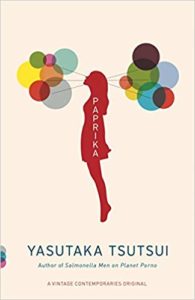Paprika
Yasutaka Tsutsui
 Atsuko Chiba has it all: The beautiful and brilliant psychiatrist is on the way to win a Nobel Prize for her work with mentally ill patients, using the PT device invented by her colleague Kosaku Tokita. As her alter ego, the “dream detective” Paprika, she uses the new machines to visit the dreams of patients, where she tries to find out the source behind their problems and attempts to cure them. This part of Atsuko’s work is illegal, but Paprika keeps being called upon by the rich and powerful in need of clandestine treatment.
Atsuko Chiba has it all: The beautiful and brilliant psychiatrist is on the way to win a Nobel Prize for her work with mentally ill patients, using the PT device invented by her colleague Kosaku Tokita. As her alter ego, the “dream detective” Paprika, she uses the new machines to visit the dreams of patients, where she tries to find out the source behind their problems and attempts to cure them. This part of Atsuko’s work is illegal, but Paprika keeps being called upon by the rich and powerful in need of clandestine treatment.
When a greatly improved version of the PT device, the DC Mini, goes missing, Atsuko and Paprika are quickly drawn into an abyss of unhealthy dreams that take over the minds of colleagues and friends. Together, they need all the help they can get to keep the dream world and its nightmares from invading the real world…
I’m in two minds about this book. I greatly enjoyed the premise and the smart way of mixing dreams and reality. Towards the end of the book, you really don’t know where you are anymore. Unfortunately, Atsuko/Paprika was a typical Mary Sue character: beautiful, highly intelligent, every man would fall in love with her the moment he laid eyes upon her… It got too much pretty soon. Also, despite having a “strong” female main character, the book was full of misogyny. Part of it are the personalities of the two main antagonists, but part of it appears to be the views of the writer too, unfortunately. Saving grace in this respect is that the book was published back in 1993, and hopefully, Japanese views on women have changed in the last 15 years. Not really a recommendation, read at your own peril!
Yasutaka Tsutsui was born in Osaka in 1934 and lives in Tokyo. His works have laid the basis for Japanese postmodern science fiction and he often integrates psychoanalysis, surrealism, time travel, dream worlds etc. A number of his books have been adapted for tv or cinema. He is the recipient of the renowned Tanizaki Prize (1987) and the Kawabata Prize (1989), among others.
Probably the most controversial book I have posted on here. Make up your own mind with a copy from amazon.
